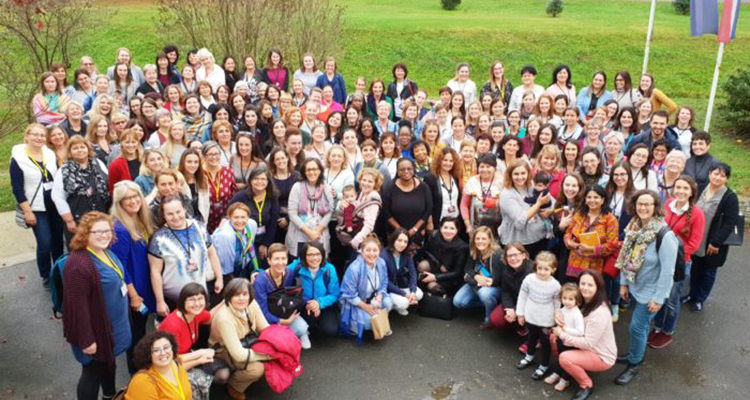European conference encourages acceptance of women in ministry

Qendressa, a Nazarene lay leader from a Balkan country where women are prohibited from leadership over men, was one of 153 women and five men who journeyed to the CALLED: Reimagine conference in Zagreb, Croatia.
The broader Christian community in her nation numbers only a few thousand and represents a very small minority of the general population. She has only seen a woman preach from the pulpit once, and that individual was an American missionary.
The concept of a Wesleyan women clergy conference has been evolving for nearly two decades. The first conference was held in Ireland in 2002 and was attended predominantly by women from Western Europe. This year’s conference in Zagreb reflects growth in numerical attendance as well as an expanding cross-denominational cooperation of Wesleyan-Holiness churches across Europe.
Conference participants included members of The Wesleyan Church, the Church of God, the Church of the Nazarene, One Mission Society, the United Methodists in Russia, and the Anglican Church.
The conference’s steering committee hoped that the intentionally broad inclusion of women into the theological conversation would be transformative. The presenters were from a diverse spectrum in terms of ethnicity, geography, age, experience, and ministry responsibilities. The attendance list stretched from women who were still exploring their call all the way to women who fulfill the top levels of ordained leadership in their denominations.
Both The Wesleyan Church and the Church of the Nazarene have benefitted from the leadership of women in every level of church administration. In 2008, JoAnne Lyons was elected general superintendent of The Wesleyan Church, the highest office for that denomination. The Church of the Nazarene has elected two women as general superintendents — Nina Gunter in 2005 and Carla Sunberg in 2017.
The conference balanced theology with times of practical skill-building with 13 workshops focused under four broad themes — the minister, the church, healthy relationships, and theology. The schedule was rounded out with two panel discussions, topical table discussions, devotionals, sermons, and a service of lament and reconciliation. The conference closed with prayer stations and the Eucharist.
A workshop led by Svetlana Khobnya, a Russian theologian and biblical studies lecturer at Nazarene Theological College–Manchester, dealt with the biblical interpretations of two passages, 1 Timothy 2:8-15 and 1 Corinthians 14:34-36, that are most often used to prohibit or set limitations on women. Qendressa says that Khobnya’s workshop was a critical point for her that left her wondering and wrestling with what obedience to God’s call in her life might mean in the future.
Another workshop, led by Tatiana Cantarella, focused on how women can maintain a healthy pastoral identity when the culture doesn’t always approve. Before moving to Minsk, Belarus, to plant a church, Cantarella pastored in Moscow, Russia. She captured the heart of the conference when she described church planting in a city where there are no other Wesleyans.
“It is a challenge to exist within a Christian community that struggles with my call and gifts because I am a woman,” Cantarella said.
Khobnya and Cantarella, who are both Russian, represent the religious contexts of the vast majority of women who attended the conference. Most churches in the former Soviet nations, the Middle East, and the Balkans prohibit a woman in the pulpit or in any place of authority or leadership over a man. For these contexts, those attending CALLED are the first generation of women ministers, and they come with the full blessing and advocacy of their denominations and organizations.
Across the vast European continent, this generation of Wesleyan-Holiness women hopes to form both a present and a future where a woman in the pulpit is a normal occurrence.
